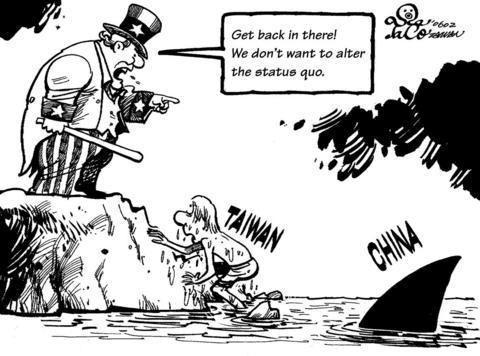You may be interested to know that your cartoon of Feb. 4 made it to a US Congressional hearing with Secretary of State Condoleezza Rice (on Thursday). We had given the cartoon to Congressman Steve Chabot, a Republican from Ohio, who made the following statement.
Gerrit van der Wees
Formosan Association for Public Affairs

Transcript of Representative Steve Chabot's comments to Condoleezza Rice at a Feb. 16 hearing:
In the time I've got left, let me just address one other issue -- cross-strait relations ... and our government's role in that area.
I've got a cartoon here which I believe came from the Taipei Times -- I'm sorry I don't have a better reproduction -- that shows a haggard looking fellow, labeled Taiwan, who is trying to extricate himself from a body of water because he is being approached by a shark, labeled China.
And he is being greeted by a rather large and menacing Uncle Sam, who appears to be holding a baseball bat. Uncle Sam is saying "Get back in there! We don't want to alter the status quo."
I use this cartoon as an illustration of the frustration I'm sure Taiwan's leaders must be feeling, and frankly, the frustration I am feeling.
It seems that every time Taiwan's democratically elected President Chen Shui-bian (陳水扁) opens his mouth, we read reports about consternation at the State Department and ominous quotes about Taiwan's attempts to change the status quo with its neighbor, the People's Republic of China (PRC).
Most recently, I understand that the State Department was gravely concerned about President Chen's decision to abolish the National Unification Council, a relic of the days when unification with China was advocated by the Taiwanese government.
Those days appear to be long gone. In fact, I'm told that the council has not met since 1999. It operated with an annual budget of US$31.
Thirty-one dollars. I think it might be a stretch to say it is a dangerous alteration of the status quo.
What I do think is a dangerous threat to the status quo is the ever-growing arms build-up in the PRC, especially the 784 missiles currently pointed at Taiwan -- a number which is increasing by around 100 per year.
That is a threat to the status quo. This increase comes after China's adoption of the so-called "Anti-Secession" Law, that, in effect, provides legal authority for China's leaders to invade democratic Taiwan. Another dangerous threat to the status quo, I would think.
Now, I will admit that I am not a big fan of our so-called "one China" policy.
I think it is wrongheaded and, frankly, dangerous, to pursue a policy that favors a dictatorship that continues to threaten war with Taiwan and has gained a reputation as one of the world's leading weapons proliferators.
Of course, I know the State Department position on "one China," but I wonder if the signals our diplomats are sending out to the world could be a little more balanced. Thank you, Madame Secretary.

As strategic tensions escalate across the vast Indo-Pacific region, Taiwan has emerged as more than a potential flashpoint. It is the fulcrum upon which the credibility of the evolving American-led strategy of integrated deterrence now rests. How the US and regional powers like Japan respond to Taiwan’s defense, and how credible the deterrent against Chinese aggression proves to be, will profoundly shape the Indo-Pacific security architecture for years to come. A successful defense of Taiwan through strengthened deterrence in the Indo-Pacific would enhance the credibility of the US-led alliance system and underpin America’s global preeminence, while a failure of integrated deterrence would
The Executive Yuan recently revised a page of its Web site on ethnic groups in Taiwan, replacing the term “Han” (漢族) with “the rest of the population.” The page, which was updated on March 24, describes the composition of Taiwan’s registered households as indigenous (2.5 percent), foreign origin (1.2 percent) and the rest of the population (96.2 percent). The change was picked up by a social media user and amplified by local media, sparking heated discussion over the weekend. The pan-blue and pro-China camp called it a politically motivated desinicization attempt to obscure the Han Chinese ethnicity of most Taiwanese.
On Wednesday last week, the Rossiyskaya Gazeta published an article by Chinese President Xi Jinping (習近平) asserting the People’s Republic of China’s (PRC) territorial claim over Taiwan effective 1945, predicated upon instruments such as the 1943 Cairo Declaration and the 1945 Potsdam Proclamation. The article further contended that this de jure and de facto status was subsequently reaffirmed by UN General Assembly Resolution 2758 of 1971. The Ministry of Foreign Affairs promptly issued a statement categorically repudiating these assertions. In addition to the reasons put forward by the ministry, I believe that China’s assertions are open to questions in international
The Legislative Yuan passed an amendment on Friday last week to add four national holidays and make Workers’ Day a national holiday for all sectors — a move referred to as “four plus one.” The Chinese Nationalist Party (KMT) and the Taiwan People’s Party (TPP), who used their combined legislative majority to push the bill through its third reading, claim the holidays were chosen based on their inherent significance and social relevance. However, in passing the amendment, they have stuck to the traditional mindset of taking a holiday just for the sake of it, failing to make good use of